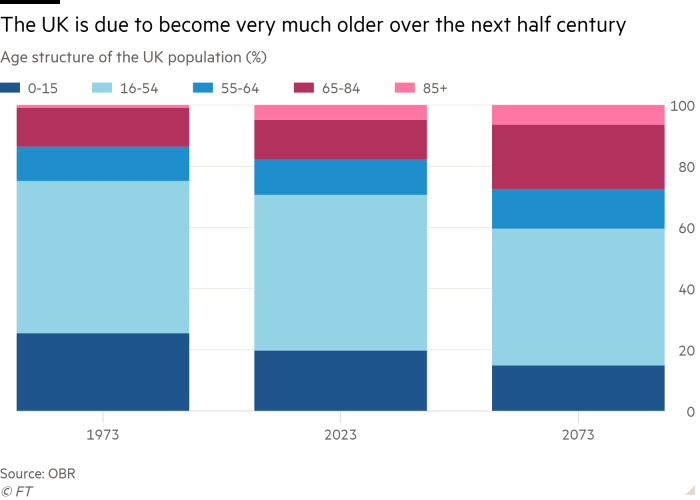Are promises of “tax cuts” credible in British politics today? The short answer is: “no”. The long answer is: it depends on what one means by tax cuts. It is certainly possible to cut some taxes and raise others overtly or (more probably) covertly. But cutting the overall tax burden would be far more difficult. To be minimally credible, any promise to cut the ratio of tax to gross domestic product permanently and substantially needs a concomitant promise to cut the level or rate of growth of spending. In theory, that is possible. A party could promise to slash spending on health, for example. But could it get elected?
In July 2023, the Office for Budget Responsibility published an excellent report entitled Fiscal Risks and Sustainability, which illuminates the situation with depressing clarity.
First, the UK has suffered a series of shocks that have, in the OBR’s words, “delivered the deepest recession in three centuries, the sharpest rise in energy prices since the 1970s and the steepest sustained rise in borrowing costs since the 1990s.” They have also pushed government borrowing to its highest levels since the 1940s, the stock of government debt to its highest level since the early 1960s and the cost of servicing that debt to its highest since the late 1980s. Note, too, that a quarter of UK sovereign debt (excluding the foreign official sector) is held by foreigners. The UK cannot get away with casual irresponsibility, as the Liz Truss interlude proved.
Second, the dynamism of the economy has been feeble ever since the global financial crisis. This is not surprising. Back in 2009 I argued that the UK would suffer not only from a permanent loss of output, but also from a permanent decline in the trend rate of economic growth. This was because the financial sector had turned it into what economists call a “monocrop” economy. No other sector has engendered comparable wealth.
Third, the country now faces the challenges of an ageing society, a less friendly economic and security environment, and climate change. It will be a huge battle just to contain the costs of care of the elderly. Spending on defence must rise. And the need to protect the country from the impact of climate change is inescapable: just the “public investments needed to support the decarbonisation of power, buildings and industry could reach £17bn a year” by 2030, notes the OBR.

Not surprisingly, then, the public finances look far from robust. True, the crisis-driven high spending of the recent past might fall, lowering the ratio of non-interest spending from 41 per cent of GDP in 2022-23 to 39 per cent in 2027-28, according to the OBR. But underlying pressures will push it back subsequently. This also ignores the reality that pressures to raise spending right now are already enormous, especially on health. In all, the position is fragile in the short run and unsustainable in the longer run. Taxes will rise.
So, any attempt to cut taxes by a significant amount relative to GDP without a parallel (or even far larger) commitment to cut spending is a fraud. Politicians who make such promises without saying how they plan to pay for them weaken the legitimacy of an already fragile democracy.
Of course, this need not prevent politicians from explaining how they might offset cuts in some taxes with increases elsewhere. The current tax system is a mess. It must be made simpler and more coherent. It could also be made both fairer and more efficient, by shifting taxation away from work and investment and on to land and other forms of wealth as well as on to polluting activities of all kind. Intelligent tax reform might even promote badly needed growth.
Meanwhile, the British must not get hysterical about their current tax levels. Yes, taxes are higher than in, say, the US. But British values are not those of Americans. They are in fact more European. The Netherlands, a richer country than the UK, had a tax ratio of 44 per cent in 2022 against the UK’s 39 per cent. As Oliver Wendell Holmes Jr. said: “Taxes are what we pay for a civilised society.”
We should also not assume that faster economic growth will solve the dilemma. As economies become richer and wages increase, the relative costs of public services tend to rise, as does the demand for them.
Taxation is ultimately driven by spending. How much (and where) a country spends, and how it pays for it, is a political decision. It defines the sort of country it wants to be. That is the issue, not fantasies of cuts that pay for themselves or magically engender growth.
Follow Martin Wolf with myFT and on X


